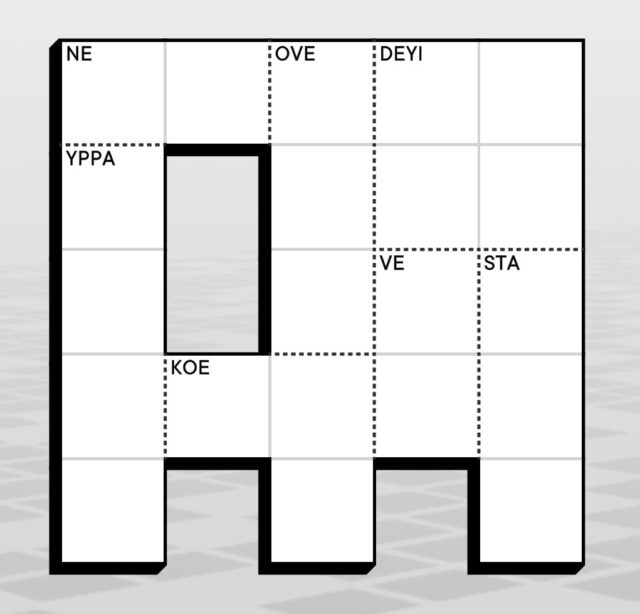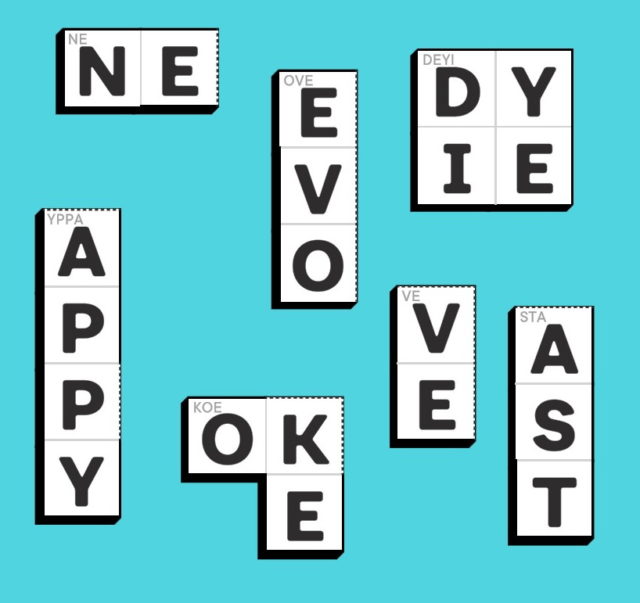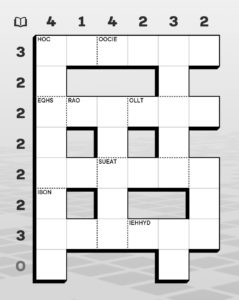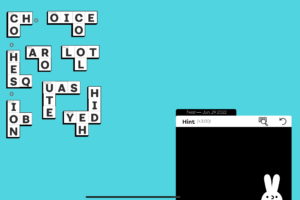Today I’m going to sing the praises of a very clever and fun word puzzle app I’ve been playing on iOS: Knotwords, by Zach Gage and Jack Schlesinger.
Knotwords is like a second cousin to crossword puzzles. You’re given a grid of rows and columns, which is broken up into sections, and for each section you’re given the letters which go into the squares in that section. So there might be a section of 5 squares, which includes pieces of 2 or 3 rows or columns, and you need to figure out which letters go where. The trick is that each row or column is a complete English word, often consisting of 2 or more sections.
Here’s a recent simple puzzle and its solution (it briefly explodes the grid when you solve it, which is what I captured for this image):


What makes Knotwords enjoyable for me is that it exploits the human mind’s ability to pattern-match, but it also allows the player to break down the puzzle into smaller pieces, building up words out of multiple sections as you go. My approach – especially with larger puzzles – is to identify the sections which appear most tractable to figure out the word, and then build out from there.
Sometimes the sections allow you to reason about the letters through knowledge of English words. For example, if there’s a section of 5 squares, with two 3-letter words which overlap, you can sometimes figure out that there are a limited number of ways to combine the letter to make valid words. Vowel placement is often key. Sometimes you can eliminate combinations, for example knowing that there’s no English word which begins with the letters ‘BK’. Knowing the 2-letter words is also helpful. The app also tells you when you’ve entered an invalid word, so you’re not just guessing. And you can ask for a hint which gives you the dictionary definition of a word you choose on the grid, but it’s rewarding to solve puzzles with a few hints as possible.
Knotwords does reward having a good vocabulary, but the words are not usually rare. I’m more likely to spell a valid word and go “What the heck is that?” and then look at it differently and realize it’s a perfectly ordinary word. I’ve solved a couple hundred puzzles so far and maybe only encountered a couple of words I didn’t know.
The system is self-correcting in a way. Sometimes you build up a valid word, but it leads to other words being invalid, and then rearranging letters to fix things up untangles the other words. You quickly develop an instinct for which words are almost certainly correct (spoiler: longer words usually have only one solution).
If that sounds good to you, then you’ll be happy to learn that there’s even more to discover. In addition to the basic puzzles, there are “twist” puzzles, where each row and column has a number indicating how many vowels are in that line. For example:
And the solution. Whenever you solve a puzzle you get a happy little bunny person in the bottom right cheering you on:
Usually additional constraints in puzzles like these make things easier for the player (for example the “Sudoku X” variant of Sudoku), but that also means the twist puzzles can be harder because you have more information to work with.
Every day you get a new simple puzzle, a classic puzzle which gets larger and harder each day from Monday through Sunday, and a twist puzzle which also gets harder through the week.
Each month there are two puzzlebooks, one classic and one twist, each with thirty puzzles. The later puzzles in these have additional twists, such as word themes. At first I was intimidated by the puzzlebooks as I got to the midpoint, but while they get pretty large, it’s not too hard to work through them. While it takes me upwards of 25 minutes to get through the largest ones, you can always pause and come back to it later.
Knotwords has built-in gamification, such as tracking your stats on the daily puzzles, achievements, and of course tracking your streaks – which you can recover if you happen to break one!
One thing to know is that the app does not yet support syncing your progress across devices; as a result, I play it only on a single iPad. (Apparently syncing is in the works, though!)
I’ve never really made the leap to doing traditional puzzles like crosswords and Sudoku on computer, but Knotwords fills that space nicely, and in a way that wouldn’t be nearly as good on paper. It’s free to try, with an in-app purchase to unlock the full range of puzzles. I didn’t hesitate to buy it once I finished the trial, and I hope this post helps it find a few more fans.


